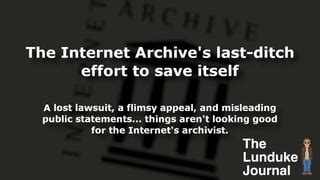The Internet Archive’s (IA) situation epitomizes a pivotal moment in the digital age, grappling with copyright laws that haven’t caught up with technological capabilities. At the heart of the controversy is IA’s National Emergency Library initiative, which, despite its humanitarian intent during the pandemic, has stirred a legal maelstrom. The defense of this initiative by IA underscores a broader philosophical battle over digital rights, which implicates not just one organization, but the global stewardship of digital information.
The upheaval isn’t just about whether IA can lend digital copies of books it owns physically; it’s about a fundamental clash between traditional copyright laws and the demands of public access in the digital era. This isn’t merely IA’s fight; it’s a proxy for larger debates surrounding how digital content is controlled, accessed, and preserved in an increasingly online world. Critics argue that IA overstepped legal bounds; supporters say it’s defending principles crucial for intellectual freedom.
Fair use, a doctrine often hailed as a guardrail against copyright overreach, is at the core of IA’s legal arguments. The principle suggests that certain uses of copyrighted material do not require the owner’s permission. However, IA’s deployment of this argument in court seeks an expanded interpretation that aligns with modern digital realities. This isn’t just legalese; it’s about adapting laws to reflect how books, articles, and other works are consumed and valued in the digital age.
Beyond legal battles, this controversy highlights significant practical implications for how digital resources are managed. If IA’s model were deemed illegal, it could set a chilling precedent for all kinds of digital libraries, potentially stifling innovation in digital archiving and access. The possibility of such an outcome has mobilized librarians, educators, and digital rights advocates, deepening the discourse around copyright reform and the sustainability of nonprofit archives.
Additionally, IA’s predicament signals the urgency for copyright law to evolve. The current laws were crafted in a pre-digital era and are ill-equipped to handle issues stemming from digital reproduction and distribution. This situation presents lawmakers with an imperative to revisit and possibly revamp copyright rules to prevent stifling innovation or hindering access to knowledge due to outdated legal frameworks.
Among public commentators, opinions vary from staunch support of IA’s initiative as a brave stand against restrictive copyright regimes to harsh criticism of its tactics as legally indefensible and reckless. This spectrum of perspectives underscores the complex interplay of legal, ethical, and technological considerations at play, driving forward the conversation on copyright’s role in the digital age.
In conclusion, the Internet Archive’s scenario is a flashpoint in a much larger debate on the future of information storage and access in the digital age. It tests the boundaries of copyright in light of new technological capabilities and challenges the adequacy of existing laws to safeguard both creators’ rights and public access to knowledge. Whatever the outcome of its legal challenges, IA’s efforts may well inspire significant shifts in copyright policy, setting precedents that could shape the landscape of digital rights and information access for years to come.


Leave a Reply